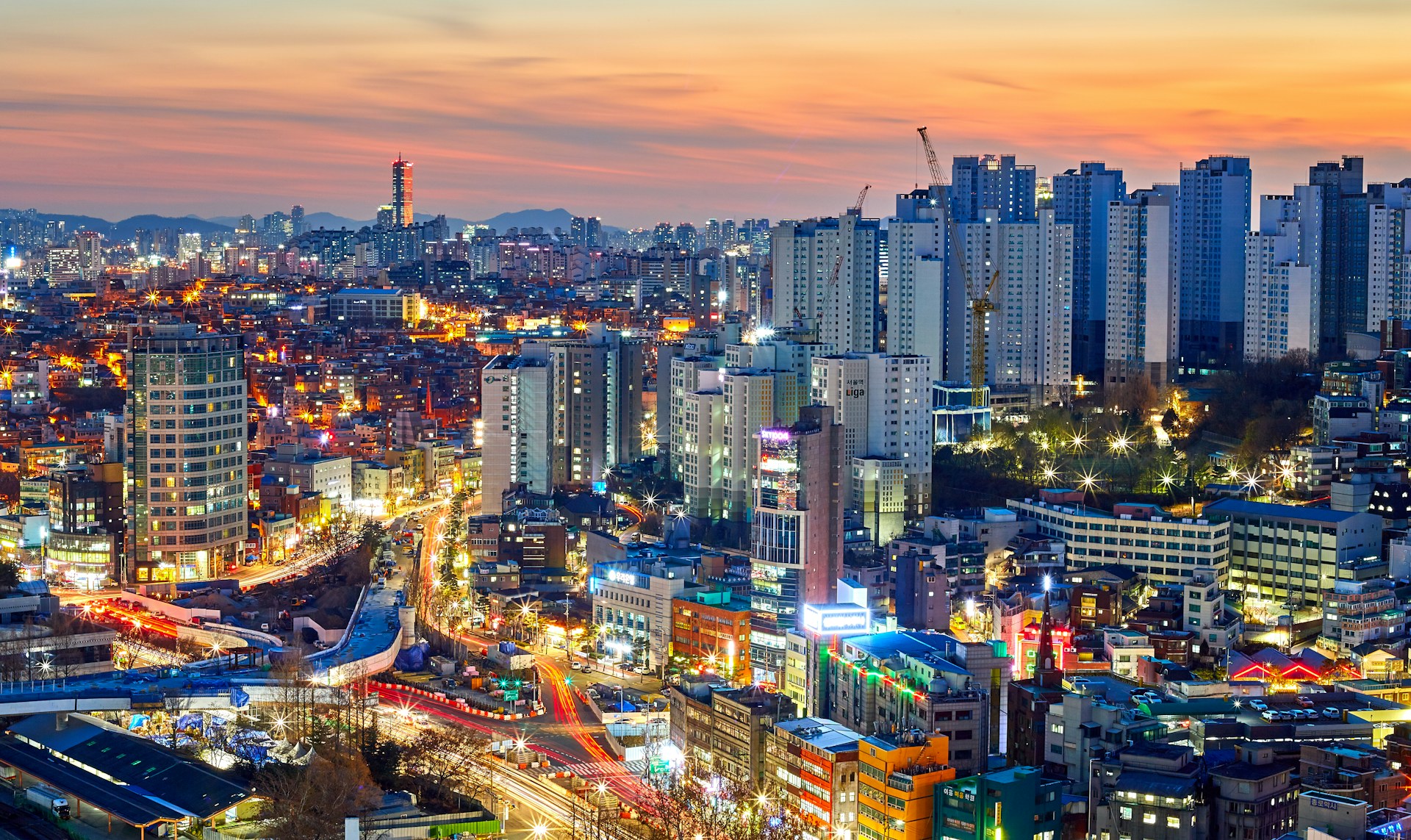Introduction
South Korea is one of the most dynamic countries in Asia—famous for its fast internet, innovative technology, vibrant cities, and rich cultural traditions. From the neon-lit streets of Seoul and the peaceful temples of Gyeongju to the coastal beauty of Busan and the scenic landscapes of Jeju Island, the country offers a balance of modern convenience and traditional charm.
As remote work continues to grow worldwide, South Korea has stepped into the spotlight with its Digital Nomad Visa, officially launched in January 2024. Known locally as the “Workcation Visa (F-1-D)”, it allows foreign professionals to live in Korea while continuing to work remotely for employers or clients abroad.
For digital nomads, this visa is a game-changer. Instead of being limited to short tourist stays, nomads can now immerse themselves in Korean life for an extended period, enjoying K-culture, delicious cuisine, and some of the best infrastructure in the world—all while working legally and securely.
What Is the South Korea Digital Nomad Visa?
The South Korea Digital Nomad Visa (Workcation Visa) is designed for foreign professionals who:
- Earn their income outside Korea.
- Work remotely as freelancers, entrepreneurs, or employees.
- Want to live in South Korea for up to 2 years while working online.
It does not allow foreigners to take jobs with Korean companies, but it provides a structured, legal pathway to stay in the country beyond standard tourist visas.
Key Features of the South Korea Digital Nomad Visa
Here’s a breakdown of the most important details:
| Feature | Details |
|---|---|
| Visa Name | Workcation Visa (F-1-D) |
| Launch Date | January 2024 |
| Duration | 1 year, renewable for another year (max 2 years) |
| Eligible Applicants | Remote employees, freelancers, entrepreneurs |
| Income Requirement | At least ₩85 million (~$66,000 USD) annually |
| Age Requirement | Must be 18 years or older |
| Experience Requirement | Minimum 1 year of professional experience in your field |
| Family Members | Spouses and children under 18 can join |
| Health Insurance | Mandatory coverage for the entire stay in Korea |
| Work Restrictions | No work for Korean companies unless you obtain a different visa |
Why South Korea Introduced the Visa
South Korea’s decision to launch the Workcation Visa reflects a mix of economic and cultural goals:
- Boosting Tourism Revenue – Long-term visitors spend more on housing, food, transport, and experiences.
- Promoting Korean Culture – With the global popularity of K-pop, K-dramas, and Korean cuisine, the visa encourages foreigners to engage more deeply with Korean society.
- Competition in Asia – Countries like Japan, Thailand, and Malaysia already have digital nomad programs. South Korea wants to stay competitive and attract global talent.
- Supporting Rural Regions – The government hopes nomads will explore not just Seoul but also smaller towns and islands, helping balance regional development.
Why South Korea Is Ideal for Digital Nomads
- ⚡ Fastest Internet in the World – Perfect for remote work, gaming, and streaming.
- 🏙 Vibrant Cities – Seoul and Busan are buzzing with coworking spaces, cafés, and international communities.
- 🍲 Food Paradise – Affordable street food and world-famous Korean BBQ.
- 🎶 Cultural Richness – K-pop, K-dramas, festivals, and centuries-old traditions.
- 🚅 Efficient Transportation – Bullet trains and modern metro systems connect the country seamlessly.
- 🛡 Safety – Low crime rates and high-quality healthcare make it family-friendly.
Eligibility Criteria
To ensure that applicants can support themselves and contribute positively to the local economy, South Korea has set specific requirements for its Digital Nomad Visa.
1. Age Requirement
- Applicants must be at least 18 years old.
2. Income Requirement
- You must prove an annual income of at least ₩85 million (~$66,000 USD / €61,000).
- Income should come from foreign sources (employers, clients, or business activities outside Korea).
3. Work Experience Requirement
- Minimum of 1 year of professional experience in your current field of work.
4. Remote Work Status
- Applicants must not work for Korean companies.
- Income must come from employers or clients abroad.
5. Health Insurance Requirement
- Mandatory private health insurance covering medical treatment in Korea for the entire stay.
- Minimum coverage must be equivalent to KRW 100 million (~$75,000).
6. Criminal Record
- Applicants must not have a serious criminal history or prior immigration violations in Korea.
7. Family Members
- Spouses and children under 18 are eligible to join.
- Must also be covered by private health insurance.
Required Documents
Here’s a checklist of documents you’ll need to prepare before applying:
| Document | Purpose |
|---|---|
| Valid Passport | Proof of identity and nationality |
| Completed Visa Application Form | Official Korean visa form |
| Passport Photos | Recent photos meeting Korean requirements |
| Proof of Income | Payslips, tax returns, or bank statements showing at least ₩85 million annually |
| Proof of Remote Work | Employment contract, freelance agreements, or business registration documents |
| Health Insurance Certificate | Proof of private insurance covering at least ₩100 million |
| Work Experience Proof | CV, reference letters, or contracts showing at least 1 year of professional experience |
| Accommodation Details | Hotel booking, Airbnb, or rental contract |
| Family Documents (if applicable) | Marriage certificate, children’s birth certificates |
Application Process
The process is straightforward but requires careful preparation. Here’s a step-by-step guide:
Step 1: Prepare Your Documents
- Collect all required documents.
- Ensure income and work proofs are recent and consistent.
- Verify that your insurance policy explicitly covers South Korea.
Step 2: Submit Application at a Korean Embassy or Consulate
- Applications must be filed outside Korea.
- Visit the Korean embassy/consulate in your home country (or country of legal residence).
Step 3: Pay Visa Fee
- Fees vary by nationality but are generally between $50–$100 USD.
Step 4: Wait for Processing
- Processing times usually range from 2–6 weeks.
- Additional documents may be requested.
Step 5: Receive Visa & Enter South Korea
- Once approved, the visa will be placed in your passport.
- Upon entry, you must show proof of insurance and other supporting documents if requested.
Step 6: Register Your Residence in Korea
- Within 90 days of arrival, you must apply for an Alien Registration Card (ARC) at the local immigration office.
- The ARC is essential for legal stay, banking, SIM cards, and other services.
Application Timeline
| Stage | Estimated Duration |
|---|---|
| Document Preparation | 2–3 weeks |
| Embassy Submission | 1 day |
| Processing | 2–6 weeks |
| Arrival & ARC Registration | Within 90 days |
| Total | Around 1–2 months before arrival |
Family Members on the Visa
- Spouses and children under 18 may accompany the main applicant.
- They will receive dependent visas linked to the main applicant’s status.
- They cannot work in Korea under this visa.
- Children may enroll in local or international schools.
Tips for a Smooth Application
✔️ Submit clear and consistent income proof (official tax returns are preferred).
✔️ Use a reputable international health insurer that meets Korea’s strict coverage requirement.
✔️ Book your embassy appointment early, as demand is increasing.
✔️ Make copies of all documents before submission.
Benefits of the South Korea Digital Nomad Visa
The Workcation Visa (F-1-D) offers digital nomads far more than just legal residency. It opens the door to one of the most advanced, safe, and culturally rich countries in Asia.
1. Extended Stay
- Unlike tourist visas (90 days), this visa allows up to 1 year, renewable once for a maximum of 2 years.
2. Family Inclusion
- You can bring your spouse and children under 18, making it ideal for digital nomad families.
3. World-Class Infrastructure
- South Korea has the fastest internet in the world, reliable public transportation, and countless coworking spaces.
4. Cultural Immersion
- From K-pop and K-dramas to traditional temples and local markets, you get a deep cultural experience beyond what tourists see.
5. Safe & Modern Environment
- South Korea consistently ranks as one of the safest countries globally.
- Excellent healthcare, low crime, and cleanliness add to its appeal.
6. Gateway to Asia
- With its central location, Korea provides easy travel to Japan, China, and Southeast Asia for weekend trips.
Cost of Living in South Korea for Digital Nomads
South Korea offers a high quality of life, but living costs depend on where you base yourself. Seoul is the most expensive, while smaller cities are more affordable.
Housing
- Seoul: ₩1.2M–₩2.5M/month ($900–$1,900) for a one-bedroom apartment.
- Busan/Daegu: ₩800K–₩1.5M/month ($600–$1,200).
- Smaller cities: ₩500K–₩900K/month ($400–$700).
Food
- Street food/snacks: ₩3,000–₩6,000 ($2–$5).
- Local restaurants: ₩8,000–₩15,000 ($6–$12) per meal.
- Western dining: ₩20,000–₩50,000 ($15–$40) per person.
- Monthly groceries: ₩400K–₩700K ($300–$500).
Transportation
- Metro/bus fares: ₩1,250–₩1,800 ($1–$1.40) per trip.
- Monthly public transport pass: ₩55K–₩70K ($40–$55).
- Taxis: Start at ₩3,800 ($3).
Coworking Spaces
- Average monthly membership: ₩150K–₩350K ($110–$260) depending on the city.
Healthcare
- Private insurance required.
- Out-of-pocket costs (with insurance): Doctor visit around ₩20K–₩40K ($15–$30).
Estimated Monthly Budget for Digital Nomads
| Location | Solo Nomad | Nomad Couple | Nomad Family (3) |
|---|---|---|---|
| Seoul | $2,500–$3,500 | $3,500–$5,000 | $5,000–$6,500 |
| Busan | $1,800–$2,800 | $2,800–$4,000 | $4,000–$5,500 |
| Smaller Cities | $1,200–$2,000 | $2,000–$3,000 | $3,200–$4,500 |
Best Cities in South Korea for Digital Nomads
South Korea offers diverse cities catering to different lifestyles.
1. Seoul – The Global Hub
- 🏙 Best for: Professionals seeking opportunities, networking, and nonstop energy.
- ✅ Pros: Largest expat community, endless coworking spaces, vibrant nightlife.
- ❌ Cons: Expensive, crowded, fast-paced.
2. Busan – Coastal Living
- 🌊 Best for: Nomads who love beaches and a more relaxed pace.
- ✅ Pros: Affordable housing, seaside views, famous seafood.
- ❌ Cons: Smaller expat scene compared to Seoul.
3. Daegu – Affordable & Cultural
- 🏯 Best for: Nomads wanting a mix of history and affordability.
- ✅ Pros: Lower cost of living, rich traditions, central location.
- ❌ Cons: Limited coworking spaces.
4. Jeju Island – Nature & Tranquility
- 🌴 Best for: Remote workers seeking peace, nature, and outdoor activities.
- ✅ Pros: Stunning landscapes, relaxed lifestyle.
- ❌ Cons: Limited job networking, slower pace.
5. Incheon – Airport & Business City
- ✈️ Best for: Frequent travelers and those in logistics/tech.
- ✅ Pros: Proximity to Seoul, international airport, growing expat community.
- ❌ Cons: Less cultural immersion compared to other cities.
Quick Comparison Table
| City | Cost of Living | Internet | Expat Community | Lifestyle |
|---|---|---|---|---|
| Seoul | $$$ | Excellent | Large | Fast-paced, modern |
| Busan | $$ | Excellent | Medium | Coastal, laid-back |
| Daegu | $ | Very Good | Small | Traditional, affordable |
| Jeju Island | $$ | Good | Small | Nature, outdoors |
| Incheon | $$ | Excellent | Medium | Airport hub, urban |
Taxes for Digital Nomads in South Korea
Tax obligations depend mainly on your length of stay and whether you are considered a tax resident.
1. Tax Residency Rules
- You are considered a tax resident if you stay in South Korea for 183 days or more in a year.
- If you stay less than 183 days, you are treated as a non-resident.
2. Taxation on Income
- Non-Residents (<183 days):
- Taxed only on Korea-sourced income.
- Remote income from foreign employers/clients is generally not taxed.
- Residents (≥183 days):
- Must pay Korean tax on worldwide income.
- Tax rates range from 6% to 45%, depending on income level.
3. Double Taxation Treaties
- South Korea has tax treaties with 90+ countries (including the U.S., UK, EU, Canada, and Australia).
- These treaties help avoid double taxation by providing exemptions or credits if you already pay taxes in your home country.
4. Other Taxes
- Value Added Tax (VAT): 10% applies to goods and services.
- Local Taxes: May apply if you register residence in certain cities.
📌 Tip: Most digital nomads will remain non-residents for tax purposes if they keep their stay under 183 days per year.
Family Rules on the Workcation Visa
One of the attractive aspects of South Korea’s digital nomad program is that you can bring your family.
Who Can Join You?
- Spouse (marriage certificate required).
- Children under 18 (birth certificates required).
Conditions for Family Members
- Must be covered by the same private health insurance policy as the main applicant.
- Spouses and children cannot work in Korea under this visa.
- They will be granted dependent visas linked to the main applicant’s F-1-D status.
Education for Children
- Children can attend local public schools (affordable, Korean language instruction).
- International schools are available but expensive (₩20M–₩40M per year).
Healthcare Access
- Family members must have health insurance covering at least ₩100 million (~$75,000).
- South Korea’s national health insurance system is not open to F-1-D visa holders.
Renewal & Extension Options
The South Korea Digital Nomad Visa is valid for 1 year and can be renewed once, giving a maximum stay of 2 years.
Renewal Conditions
- Must still meet income requirements.
- Must maintain valid private health insurance.
- Updated proof of remote employment or business is required.
Switching to Other Visa Types
If you want to stay longer than 2 years, you can explore:
- D-8 Business Investment Visa → For entrepreneurs starting a company in Korea.
- E-7 Work Visa → If you get sponsorship from a Korean employer.
- D-2 Student Visa → If enrolling in Korean universities or language programs.
- F-2 Long-Term Residency Visa → For skilled professionals or investors who meet point-based criteria.
Permanent Residency & Citizenship
- The Workcation Visa does not directly lead to permanent residency.
- However, time spent in Korea may help you build the case for a longer-term visa pathway, if you later qualify.
- Permanent residency (F-5) typically requires several years of continuous residence in Korea under qualifying visa categories.
Legal & Practical Considerations
✔️ No Korean Employment Allowed – You cannot earn money from Korean companies or clients under this visa.
✔️ ARC Registration – You must apply for an Alien Registration Card within 90 days of arrival.
✔️ Mandatory Insurance – Proof of valid insurance must be carried at all times.
✔️ Overstay Penalties – Overstaying can lead to fines, deportation, and bans from reentry.
✔️ Travel Flexibility – Multiple entries and exits are allowed during visa validity, but you must keep valid re-entry documentation.
Frequently Asked Questions (FAQs)
1. How long can I stay in South Korea with the digital nomad visa?
The visa is valid for 1 year and can be renewed once, for a maximum stay of 2 years.
2. Can I work for a Korean company with this visa?
No. The visa only allows remote work for foreign employers, clients, or businesses. To work in Korea, you need a different visa (e.g., E-7 work visa).
3. Do I need to pay taxes in Korea?
- If you stay less than 183 days in a year, you are taxed only on Korea-sourced income.
- If you stay 183 days or more, you are considered a tax resident and may be taxed on worldwide income.
4. Can I bring my family?
Yes. Spouses and dependent children under 18 can accompany you. They cannot work, but they can study and live in Korea under your visa.
5. What is the minimum income requirement?
You must prove at least ₩85 million (~$66,000 USD) in annual income from overseas work.
6. Do I need health insurance?
Yes. You must have private health insurance that covers at least ₩100 million (~$75,000) in medical expenses for the entire stay.
7. Where do I apply for the visa?
You must apply at a Korean embassy or consulate in your home country or country of legal residence.
8. How long does the application process take?
Typically 2–6 weeks, depending on your embassy and whether additional documents are requested.
9. Can my children attend school in Korea?
Yes. Children can attend local public schools (affordable but taught in Korean) or international schools (expensive but English-taught).
10. Can I switch to another visa later?
Yes. If you qualify, you can transition to a business, student, or work visa after your digital nomad visa expires.
Conclusion
The South Korea Digital Nomad Visa (Workcation Visa, F-1-D) opens exciting opportunities for remote professionals seeking to live in one of the most advanced and culturally vibrant countries in the world. With its 1–2 year validity, family-friendly policies, and excellent infrastructure, it offers a balance of modern living, cultural immersion, and work-life convenience.
However, this visa is best suited for high-earning professionals who meet the income requirements and can sustain themselves without local employment. While it doesn’t directly lead to permanent residency, it provides a unique gateway to experience South Korea deeply—from Seoul’s futuristic skyline to Busan’s beaches and Jeju’s natural beauty.
If you’re looking for a safe, modern, and inspiring destination to base your remote career, South Korea’s digital nomad visa could be the perfect choice.
Final Checklist for Applicants
Before applying, make sure you have:
- ✅ Valid passport
- ✅ Proof of income (₩85M+ annually)
- ✅ At least 1 year of professional experience
- ✅ Remote work contracts or business ownership documents
- ✅ Private health insurance covering ₩100M+
- ✅ Completed visa application form
- ✅ Family documents (if bringing dependents)



